| Srl | Item |
| 1 |
ID:
123729
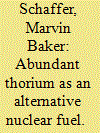

|
|
|
|
|
| Publication |
2013.
|
| Summary/Abstract |
It has long been known that thorium-232 is a fertile radioactive material that can produce energy in nuclear reactors for conversion to electricity. Thorium-232 is well suited to a variety of reactor types including molten fluoride salt designs, heavy water CANDU configurations, and helium-cooled TRISO-fueled systems.
Among contentious commercial nuclear power issues are the questions of what to do with long-lived radioactive waste and how to minimize weapon proliferation dangers. The substitution of thorium for uranium as fuel in nuclear reactors has significant potential for minimizing both problems.
Thorium is three times more abundant in nature than uranium. Whereas uranium has to be imported, there is enough thorium in the United States alone to provide adequate grid power for many centuries. A well-designed thorium reactor could produce electricity less expensively than a next-generation coal-fired plant or a current-generation uranium-fueled nuclear reactor. Importantly, thorium reactors produce substantially less long-lived radioactive waste than uranium reactors.
Thorium-fueled reactors with molten salt configurations and very high temperature thorium-based TRISO-fueled reactors are both recommended for priority Generation IV funding in the 2030 time frame.
|
|
|
|
|
|
|
|
|
|
|
|
|
|
|
|
| 2 |
ID:
153367


|
|
|
|
|
| Summary/Abstract |
Sometime late last year, ground-launched cruise-missile batteries left Russia’s Kapustin Yar test range, possibly on flatbed rail trucks.1 Amongst these, United States officials contend, was a system that drives a coach and horses through the 1987 Intermediate-Range Nuclear Forces (INF) Treaty. Washington asserts that the cruise missile deployed at the end of 2016 has a range significantly above the INF Treaty threshold. Russia has so far dismissed the US claims.
|
|
|
|
|
|
|
|
|
|
|
|
|
|
|
|
| 3 |
ID:
055136
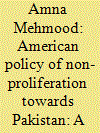

|
|
|
| 4 |
ID:
051966
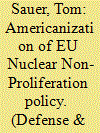

|
|
|
| 5 |
ID:
155770
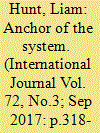

|
|
|
|
|
| Summary/Abstract |
American nuclear diplomacy generally presents a set of explanatory conditions ripe for the political realist: rogue states, an alarmed public, and existential risk create a milieu apt for realpolitik. This case study closely examines the link between the Joint Comprehensive Plan of Action and the theoretical trends in United States foreign policy, specifically with respect to the dictates of neorealism. At the time of writing, the bulk of literature on the Joint Comprehensive Plan of Action and its consequent developments remains lacking in theoretical commentary on how the agreement relates to broader narratives of United States foreign policy. This essay bridges the gap in the literature by drawing a connection between the Iran nuclear deal, neorealism, and liberal institutionalism. The findings suggest that the Joint Comprehensive Plan of Action marks a significant deviation from the predictions of realism, instead acting as an example of liberal institutionalism and potentially signalling a greater shift toward multilateralism in United States foreign policy.
|
|
|
|
|
|
|
|
|
|
|
|
|
|
|
|
| 6 |
ID:
063201
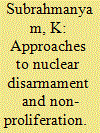

|
|
|
| 7 |
ID:
005830
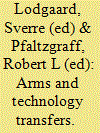

|
|
|
|
|
| Publication |
New York, United Nations, 1995.
|
| Description |
xvi,287p.
|
| Standard Number |
9290451033
|
|
|
|
|
|
|
|
|
|
|
|
Copies: C:3/I:0,R:0,Q:0
Circulation
| Accession# | Call# | Current Location | Status | Policy | Location |
| 037307 | R 338.926/LOD 037307 | Main | On Shelf | General | |
| 037308 | R 338.926/LOD 037308 | Main | On Shelf | General | |
| D37308 | R 338.926/LOD D37308 | Main | On Shelf | General | |
|
|
|
|
| 8 |
ID:
088242
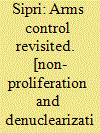

|
|
|
|
|
| Publication |
Warszawa, SIPRI, 2009.
|
| Description |
75p.
|
| Series |
WARSAW Papers and Reports Nov 20-21, 2008
|
| Standard Number |
9788389607621
|
|
|
|
|
|
|
|
|
|
|
|
Copies: C:1/I:0,R:0,Q:0
Circulation
| Accession# | Call# | Current Location | Status | Policy | Location |
| 054188 | 327.174/SIP 054188 | Main | On Shelf | General | |
|
|
|
|
| 9 |
ID:
105658
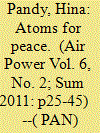

|
|
|
| 10 |
ID:
146427
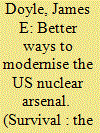

|
|
|
|
|
| Summary/Abstract |
The planned modernisation of the United States’ nuclear forces raises a number of national-security dilemmas that demand the nation’s full attention. Nuclear weapons can deter potential adversaries, but they also create the risk of a nuclear war that would destroy everything the United States seeks to protect. Maintaining too few nuclear weapons could create vulnerabilities, but building too many may lead to war by creating misperceptions of American intentions or consuming defence resources that are needed to address other urgent threats. Effective strategy therefore requires a balance of forces that can survive enemy attack and deliver devastating retaliation while promoting peaceful, stable relationships among states and minimising the chances of nuclear war, nuclear terrorism and further nuclear proliferation.
|
|
|
|
|
|
|
|
|
|
|
|
|
|
|
|
| 11 |
ID:
153343
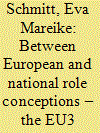

|
|
|
|
|
| Summary/Abstract |
This paper addresses whether Germany, France and the UK (the EU3) – with the EU in the background – can shape their own approach to a common Europeanised position or even a European role conception regarding the Iranian Nuclear Programme. As the EU3 initiative appears situated between Europeanisation and national role conceptions, it seems that the EU3 members – after a coherent start – were finally inclined to readapt themselves to certain of their national role conceptions, resulting in a “mix” of national and European role patterns in the process leading up to 2016. Currently, this mix hints at still-prevailing hindrances involved in genuine European conflict management, although this outcome holds the promise of greater European coherence in the future.
|
|
|
|
|
|
|
|
|
|
|
|
|
|
|
|
| 12 |
ID:
020577
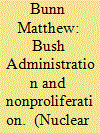

|
|
|
|
|
| Publication |
Winter 2002.
|
| Description |
17-34
|
|
|
|
|
|
|
|
|
|
|
|
|
|
|
|
| 13 |
ID:
052399
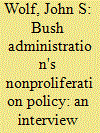

|
|
|
| 14 |
ID:
090196
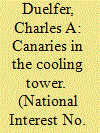

|
|
|
|
|
| Publication |
2009.
|
| Summary/Abstract |
IN LIGHT of the costly tragedy in Iraq, some have commented that inspections would have been an alternative to war. They were not. It was not that simple. Moreover, even with the most intrusive and extensive inspection system ever implemented, we still did not know the extent of Iraq's WMD capacity. Arms inspections are no substitute for war or political compromise, or good independent intelligence. Too often, too many have expected too much from such mechanisms. Inspections are not a goal in themselves. As the urgency and perils of North Korean and Iranian nuclear programs continue to escalate unchecked, attention repeatedly turns to inspections as the remedy of all ills. Yet, the invasiveness of the Iraq inspections was unique. We will never again be able to cajole another country to the extent we did Baghdad. And still we see the limits that even these intrusive inspections had. But, there are untold lessons to be learned from this bizarre case. More than anything else it goes to show that, in spite of their failings, inspections have a purpose and can be wielded to gain information and to deter WMD programs.
|
|
|
|
|
|
|
|
|
|
|
|
|
|
|
|
| 15 |
ID:
090189
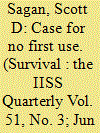

|
|
|
|
|
| Publication |
2009.
|
| Summary/Abstract |
In his 5 April 2009 speech in Prague, US President Barack Obama promised that 'to put an end to Cold War thinking, we will reduce the role of nuclear weapons in our national security strategy and urge others to do the same'. The forthcoming Nuclear Posture Review (NPR), mandated by Congress, provides the administration an opportunity to honour that commitment. To reduce the role of nuclear weapons in national security strategy, however, the next NPR must abandon the long-standing US policy of threatening to use its nuclear weapons first in a variety of military scenarios. This basic step was not taken in the George W. Bush administration's 2001 NPR, despite its claim to institute 'a major change in our approach to the role of nuclear offensive forces in our deterrent strategy' and call to 'both reduce our dependence on nuclear weapons and improve our ability to deter attack in the face of proliferating [weapons of mass destruction (WMD)] capabilities'. Indeed, the 2001 NPR contradicted these stated ambitions by maintaining that nuclear weapons were still necessary to 'provide credible military options to deter a wide range of threats, including WMD and large-scale conventional military force'.
|
|
|
|
|
|
|
|
|
|
|
|
|
|
|
|
| 16 |
ID:
082540
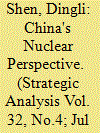

|
|
|
|
|
| Publication |
2008.
|
| Summary/Abstract |
This article offers a Chinese perspective on reducing the threat of nuclear weapons due to nuclear weapons proliferation and its deterrent gestures, long employed since the Cold War. It is pointed out that nuclear weapons are increasingly irrelevant to nuclear weapons states. However, some non-nuclear weapons states may view this differently. Nuclear abolition has presented a visionary opportunity for all sides to relinquish those weapons increasingly unnecessary for nuclear weapons states. Before such an idealistic world is attained, efforts of nuclear non-proliferation are indispensable along with a process of nuclear disarmament.
*This article is written for this issue of Strategic Analysis only, as part of the Project of 'A Sino-US Joint Study of Non-Traditional Security' at the Center for American Studies, Fudan University (State Innovative Research Base of Philosophy and Social Science
|
|
|
|
|
|
|
|
|
|
|
|
|
|
|
|
| 17 |
ID:
099020
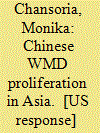

|
|
|
|
|
| Publication |
New Delhi, KW Publishers, 2009.
|
| Description |
xvii, 246p.
|
| Standard Number |
9788190743198, hbk
|
|
|
|
|
|
|
|
|
|
|
|
Copies: C:1/I:0,R:0,Q:0
Circulation
| Accession# | Call# | Current Location | Status | Policy | Location |
| 055259 | 327.51/CHA 055259 | Main | On Shelf | General | |
|
|
|
|
| 18 |
ID:
002814
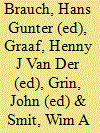

|
|
|
|
|
| Publication |
Amsterdam, VU University Press, 1992.
|
| Description |
xxxix, 406p.,tables
|
| Standard Number |
9053581037
|
|
|
|
|
|
|
|
|
|
|
|
Copies: C:1/I:0,R:0,Q:0
Circulation
| Accession# | Call# | Current Location | Status | Policy | Location |
| 034448 | 355.82/BRA 034448 | Main | On Shelf | General | |
|
|
|
|
| 19 |
ID:
051785
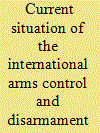

|
|
|
| 20 |
ID:
101263
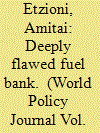

|
|
|